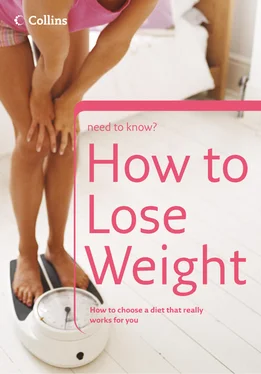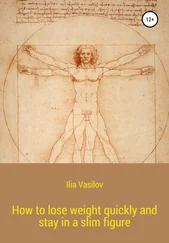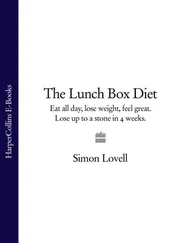Eating for two
A 2005 survey of 2,000 new mothers found that nearly two years after giving birth, their average weight was a stone heavier than they had been before their pregnancy. Of course, putting on some weight is expected and desirable in pregnancy. However, many women who have never had a weight problem find that the pounds pile on and then prove very hard to lose long after their baby is born – so much so that they despair that pregnancy has somehow changed their natural weight forever. The reassuring news is that there seems to be no fundamental, physical reason why this should be the case. It appears more likely that any weight gain is a side-effect of the upheaval in lifestyle that can come with the arrival of a new baby: lack of sleep, snatched meals, no time for exercise and more time spent at home can all alter the energy balance sufficiently so that weight goes on and stays put.
Monitoring your weight in pregnancy and not ‘eating for two’ so that you do not gain too much is sensible; around 13 kg (28 lb) is an average amount. Breastfeeding is good for the baby and for you, as it uses up around 500 calories a day. Crash diets and intensive exercise are not the way to regain your pre-pregnancy shape, whatever you might read in celebrity magazines. Instead, go for a slow and steady weight loss, with a healthy diet and gradual increase in activity, and aim to lose any surplus pounds over a period of months rather than weeks.
It’s my age
Is it inevitable to gain weight as we get older? Surveys suggest that we are at our heaviest in our 40s and 50s, and that the main reason for this is that we become gradually less active, rather than eating more. One large research project found that most adults will gain 9 kg (20 lb) between the ages of 20 and 55 years unless they take specific steps to avoid it.
So eating as if you are still playing football twice a week, when these days you are watching it on television twice a week, is a relatively effective way to score an own-goal as far as your weight goes.
must know
Drugs and medication
Weight gain can be a side-effect of some drugs and medical treatments. These include cancer drugs, such as tamoxifen; some steroids and antidepressants; and some drugs for diabetes and epilepsy. Ask your GP about the side-effects of any medication you are prescribed and whether you need to be careful about your diet while you are taking it.
The menopause
Women going through the menopause often feel they have more trouble managing their weight and may accept gaining the ‘menopause 10’ as an inevitable side-effect. However, as with pregnancy, that other major hormonal event, research suggests that the menopause does not necessarily lead directly to weight gain, although increased levels of testosterone and decreased levels of oestrogen may mean that the distribution of weight will change slightly, so that ‘pear’ shapes become ‘apples’ – the classic middle-age spread.
As we saw earlier, carrying excess weight around the waist represents a higher risk of developing health problems than on the hips and thighs, so it is well worth aiming to get your weight into the healthy range and your waist below 80 cm (32 in).
want to know more?
Take it to the next level. . .
 Work out your own energy balance
Work out your own energy balance
 Boost your metabolism with exercise
Boost your metabolism with exercise
Build activity into daily life
Other sources
Buy a pedometer to monitor how active you are each day.
Swap to low-fat, low-sugar versions of the foods you crave to enjoy the taste without the calories.
 For more on healthy family eating: www.nutrition.org.uk
For more on healthy family eating: www.nutrition.org.uk
Spot the obesogens in your daily life: are there ways to combat them?
 Join a reputable slimming club for support in healthy eating and managing your weight.
Join a reputable slimming club for support in healthy eating and managing your weight.
4 The science of weight loss
Understanding the energy equation and how to alter it in order to promote weight loss instead of weight gain is the key to reaching a healthy weight. Knowing the facts can be the basis of taking control of your weight and staying motivated throughout a safe and steady weight loss campaign.
The last section looked at the energy equation and the different factors that can affect it. Now the time has come to apply those principles to individual circumstances.
must know
Calories
One calorie (4.2 joules) is the amount of energy required to raise the temperature of 1 gram of water by 1 degree Centigrade. Nutritionists measure the calorie values of foods by burning them in a calorimeter to see how much heat they give off. The major food groups differ in ‘energy density’ –the number of calories they contain per gram:
 Fats have 9 calories per gram.
Fats have 9 calories per gram.
 Alcohol has 7 calories per gram.
Alcohol has 7 calories per gram.
Carbohydrates have 4 calories per gram.
 Proteins have 4 calories per gram.
Proteins have 4 calories per gram.
Altering the energy balance
The next few pages set out how far to reduce your calorie intake and increase your calorie output in order to create your own personalized slimming plan which will guarantee safe and steady weight loss.
As the previous chapter showed, the science behind weight loss and weight gain is all about the energy equation: consuming more energy, in the form of food, than is expended in activity results in weight gain. To lose weight, it is essential to create an ‘energy deficit’ so that more energy is expended in activity than is taken into the body as food.
Units of energy
The units of energy used to measure this process are kilojoules or calories – the word that can be very off-putting for people who have followed the kind of diet that requires the counting and measuring of every single mouthful they consume. Unfortunately, it is impossible to ignore calories when trying to lose weight. It is true that there are plenty of diets that promise you ‘need never count another calorie’. This is generally because they either give calories another name, such as ‘units’, or because they ensure that calorie intake is controlled automatically by limiting the kinds of foods that can be eaten.
Calculating your energy deficit
The aim of this section is to show you how to calculate a personalized energy deficit by working out:
 Your current energy expenditure.
Your current energy expenditure.
 Your current energy consumption.
Your current energy consumption.
 Your daily energy requirements needed to lose weight steadily.
Your daily energy requirements needed to lose weight steadily.
Читать дальше

 Work out your own energy balance
Work out your own energy balance










